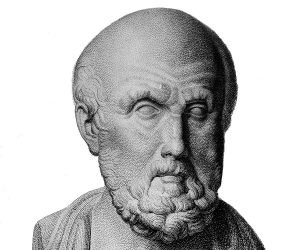Hippocrates of Kos
 Born on the island of Kos around 460 BC, the ancient Greek physician Hippocrates is considered the father of medicine, as he was the first known physician to believe that diseases were caused by some type of natural action, rather than being instigated by spirits or gods.
Born on the island of Kos around 460 BC, the ancient Greek physician Hippocrates is considered the father of medicine, as he was the first known physician to believe that diseases were caused by some type of natural action, rather than being instigated by spirits or gods.
In addition to recognising that supernatural forces do not cause disease, Hippocrates invented clinical medicine and what we know today as the doctor-patient relationship.
Perhaps most amazingly of all, he was the first known physician to recognise that thoughts and emotions arise in the brain rather than the heart.
Hippocrates was also the medical practitioner who created an oath of conduct for physicians, the Hippocratic Oath, which has remained the cornerstone of medical ethics for 2,500 years.
Kos Town is the location of Hippocrates’ Plane Tree, supposedly the tree under which the famous ancient physician taught his pupils. However, we are sorry to say that the consensus is that the tree is around 500 years old, although some speculate that it could be as old as 2,000 years. However, it may be a descendant of the original tree, which allegedly stood there 2,400 years ago in Hippocrates’ time.
What is accepted is that it is not the original tree under which he is said to have taught, and although this is an attractive tourist story, it continues to be reported by most poorly researched guidebooks as fact.
Hippocrates’ tree is situated on the “Platía Platanou” (the “Square of the Platane”), in front of the Castle of Knights and next to the Gazi Hassan Mosque in the centre of Kos town.
Outside Kos Town, near the Asklepion archaeological site, is the Hippocratic Foundation, which is dedicated to the life and teachings of the world-famous physician.
On the site is the Hippocratic Museum, which presents the visitor with the history of the foundation, dedicated to transmitting knowledge about Hippocrates. The displays include literature about Hippocratic medicine, writings, models of statues, coins, surgical tools, therapeutic plants and herbs and medals and images depicting Hippocrates.

